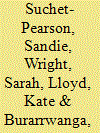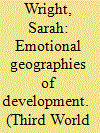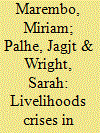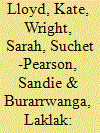|
|
|
Sort Order |
|
|
|
Items / Page
|
|
|
|
|
|
|
| Srl | Item |
| 1 |
ID:
123498


|
|
|
|
|
| Publication |
2013.
|
| Summary/Abstract |
This collaboratively written paper takes the reader on a journey to Bawaka, in North East Arnhem Land, northern Australia, to explore how a Yol?u ontology of co-becoming can inform natural resource management (NRM) theory and practice. By focusing on the process of gathering and sharing miyapunu mapu (turtle eggs) and the foundational Yol?u concept of wetj, we challenge NRM to take seriously Indigenous ways of knowing and becoming, and to attend to the vibrant, more-than-human relationality of our world. We discuss this relational cosmology, highlighting the importance of being aware and attentive, as well as the underlying ethical imperative of responsibility and obligation. We argue that as important as the concept of Caring for Country has been for NRM in Australia, it is critical that the human imperative to care for Country is balanced with a multi-directional and beyond-human understanding of the human-Country relationship. This requires engagement with the ways Country also cares and acknowledgement that humans are part of Country and not separate from it. We therefore propose a reframing, that we not only Care for Country but Care as Country. This has implications for understanding the ways that humans can and should relate to the environment as they exist together through co-becoming.
|
|
|
|
|
|
|
|
|
|
|
|
|
|
|
|
| 2 |
ID:
123517


|
|
|
|
|
| Publication |
2012.
|
| Summary/Abstract |
Hope, despair, fear, hate, joy, desire and anger; the social scienceshave increasingly recognised the role of emotions in shaping society, and in defining and transforming people and place. Such concerns have clear implications for the study of development. Emotions help create development subjects and define subjectivities. They are imbricated in the production of exclusions and colonialisms yet they can also empower resistance and progressive change. In short, they are intimately bound up with the way development functions in all its messiness. In this paper I begin to explore the generative role of emotions in the discourses and practices of development. I draw on empirical work with land reform participants in the Philippines to consider the ways emotions are central to participants' experiences. Emotions inform how the land tillers act and react, and how they understand the past, present and future. I find that consideration of emotions, and indeed of all that is beyond-the-rational, is imperative if we are to move beyond development's modernist roots towards more postcolonial understandings.
|
|
|
|
|
|
|
|
|
|
|
|
|
|
|
|
| 3 |
ID:
154558


|
|
|
|
|
| Summary/Abstract |
The Vidarbha region in Maharashtra, India, home to 3.4 million smallholder farmers, is a major cotton-producing region in one of the wealthiest Indian states. However, between 1995 and 2013, more than 60,000 farmers took their own lives. Many of these suicides have been linked to extreme debt created by the expensive mono-cropping of Bt cotton. Some farming households have responded to these pressures by abandoning Bt cotton growing and turning to sustainable agriculture using traditional mixed-cropping methods. Yet the question remains: have the changes produced better livelihoods in Vidarbha? Using a food sovereignty framework, we assess the impact of these changes through an analysis of a 200-household survey across six districts in Vidarbha. We also explore the meaning of food sovereignty for those who practise it, seeking to better understand some of the complexities and experiences associated with the term.
|
|
|
|
|
|
|
|
|
|
|
|
|
|
|
|
| 4 |
ID:
123515


|
|
|
|
|
| Publication |
2012.
|
| Summary/Abstract |
This paper draws on the collaborative experiences of three female academics and three generations of Yol?u women from an Aboriginal family from Bawaka, North East Arnhem Land to contribute to debates in development around participation, power and justice. Through a reflection on the process of collaboratively co-authoring two books and associated outputs, the paper discusses the way the collaboration is guided by collective priorities that are held as paramount: trust, reciprocity, relationships and sharing goals. The paper draws particular attention to the essential role that families and non-human agents play in shaping these priorities. The relational ontology which underlies this collaboration is inspired by a Yol?u ontology of connection that requires us to acknowledge ourselves as connected to each other, to other people and to other things. Guided by this Indigenous ontological framework, we reframe the concept of collaboration and of development as inherently and always relational.
|
|
|
|
|
|
|
|
|
|
|
|
|
|
|
|
|
|
|
|
|